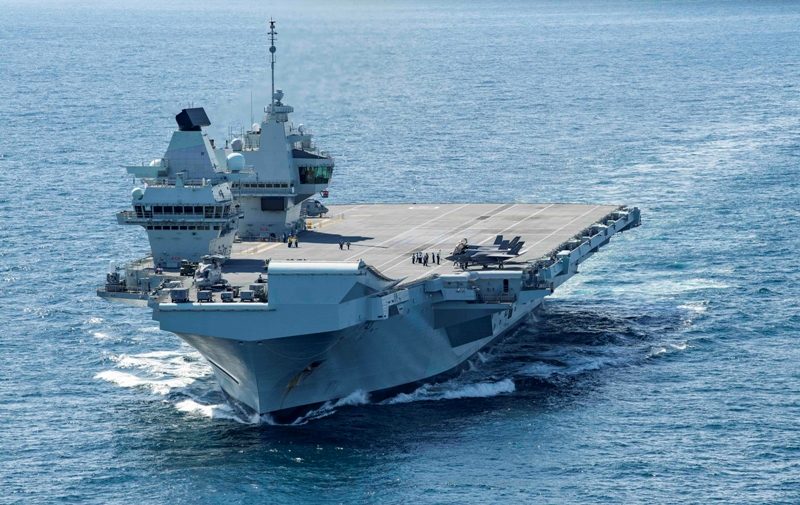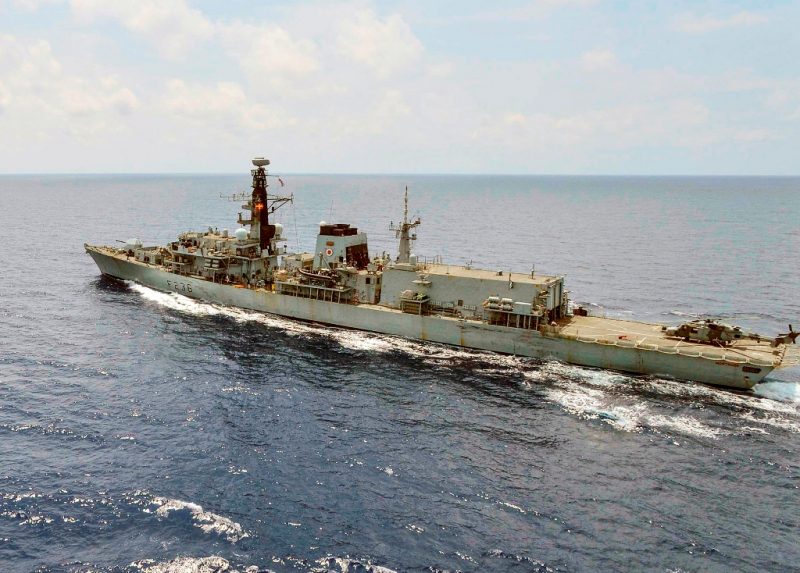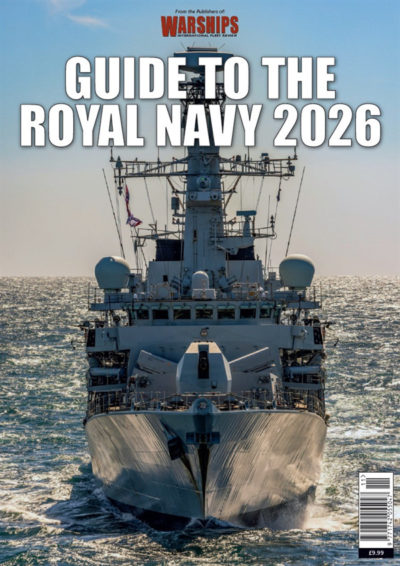
Most people who know anything about naval affairs agree that David Cameron’s 2010 Strategic Defence and Security Review (SDSR) was a disaster that inflicted damage the Royal Navy is still struggling to cope with. Only the former Prime Minister and some of his ex-ministers – notably George Osborne, Oliver Letwin and former Liberal Democrat leader Nick Clegg – would dare to suggest it was a success. Yet they were surely among those most culpable for such an ill-timed, poorly conceived and rushed hatchet job.
However, Cameron’s short-sighted views may not be peculiar to him and he continues to insist that he actually left the Navy in excellent shape when he jumped ship from being P.M. in 2016. See our review of Cameron’s ‘For the Record’ in the November 2019 edition (‘Litany of Excuses from Ex-P.M. Who Wrecked a Navy’). Cameron’s Defence myopia is not uncommon amid a generation of UK politicians who have knackered the Navy (and the rest of Britain’s armed forces) while remaining apparently in blissful ignorance about the damage they have done.
Don’t get us wrong – there are politicians who have protested (and tried to take action) over serial defence cuts and shambolic management of the military. They have been good foot soldiers in the battle to save what is left of the UK Armed Forces from further harm. The political leadership of the UK has, however, been woefully out of step with reality. It remains stuck in a 1990s time warp when it comes to Defence, committed to a so-called ‘peace dividend’ that was paid long ago.
It may simply be that there are so few votes in Defence for political chieftains to show serious interest in where we are now and the scale of what needs to be done. It is, after all, more than 30 years since victory in the Falklands War turned around Margaret Thatcher’s fortunes at the polls.
Today’s Royal Navy has a fleet of aircraft carriers, destroyers, frigates and submarines that in sheer numbers is a third of what it was in 1991, when the cost-cutting began with a vengeance (and has never really let up). For all the claims of a Navy ‘growing for the first time in decades’ the Royal Navy remains thinly spread, as recent events in the Arabian Gulf have shown. Some ships may be getting bigger, but force levels are inadequate. No amount of blues skies thinking about new ways of doing things with (as yet immature) technologies can make up for the lack of critical mass in fighting steel (and people). There are, as Odin and others have previously pointed out in WARSHIPS IFR, severe capability gaps at the lower end of the Royal Navy’s small force structure.
Prime Minister Boris Johnson, however pre-occupied with Brexit problems, must nevertheless address Defence concerns. That is, if his time in office is not ended within the next few weeks by an astonishing victory by Labour or Corbyn grabbing the levers of power in cahoots with smaller parties determined to thwart Brexit.
Johnson has seemingly recognised that Britain is an outward-looking, island nation, and has observed that it ‘needs a shipbuilding industry and Royal Navy that reflect the importance of the seas to security and prosperity’. He has reiterated that he looks forward to the restoration of British influence and excellence across the world’s oceans.
However, like every P.M. of recent times he talks the talk while not really walking the walk via meaningful expansion of the Royal Navy of the kind necessary to make friends and influence people via a sustained global presence.
Current Chancellor of the Exchequer Sajid Javid, has said the Johnson government will provide £2.2 billion of extra funding for the Ministry of Defence (MoD) over the next two years. That will be a real-terms increase of 2.6 per cent in Defence spending. It is said £1.2 billion of new funding will come in this financial year, with an extra £1 billion for 2020-2021. But, with UK politics so turbulent, what chance do we stand of seeing such promises fulfilled, especially if Jeremy Corbyn becomes even a temporary leader to extract Britain from the Brexit imbroglio?
The leader of the Opposition has claimed that he is not a pacifist. He has named the Spanish Civil War, the Royal Navy’s blockade of West Africa to stop the slave trade in the 19th Century, and the role of UN peacekeepers in the 1999 crisis in East Timor as justified conflicts. These choices – like his pick of biscuits to go with a cup of tea in a survey by a web site – are guided by their solid socialist appeal, not driven by what is in the UK’s national interest per se. Some of Corbyn’s confederates in the leadership blame the world’s conflicts on the West, and seems content to give malign actors such as Russia and Iran a free pass.

Regardless of what the Labour Party 2019 manifesto says – basically maintaining the status quo on Defence – we can forget any boost to RN conventional force levels under a Corbyn government, though in fairness the Tories have similarly failed to grasp that nettle.

The promise of a Strategic Defence and Security Review in the Labour manifesto is when the more radical Labour proposals on Defence will be revealed. Corbyn, like many on the hard left, cultivates deep enmity towards the USA, the UK’s closest partner militarily, is against maintaining the nuclear deterrent and has voiced opposition to NATO while supporting causes in the past that have been rather much against Britain and its global interests. At best a government led by Jeremy Corbyn would pursue a triple commitment to Defence, overseas aid and diplomacy, seeking to resolve potential conflicts through political action rather than relying on military force.
At worst a Corbyn government could complete the wrecking job David Cameron started when it comes to the Navy, ordering Trident submarines into port, putting the strike carriers into mothballs and pursuing global strategic aims in opposition to the USA’s (or even any previous UK Govt’s).
Corbyn is, however, no longer the likely next Prime Minister that he may once have been, for coming up fast on the outside track to gain political power and influence are the Liberal Democrats, whose position on Defence is nebulous. Their leader, Jo Swinson, who has generally voted for the use of UK military forces in combat operations overseas, has also voted against replacing Trident with a new nuclear weapons system. When in the Cameron-led coalition government the Lib Dems went along with the defence cuts, and were instrumental in applying them.
The Liberal Democrats have unveiled a 2019 election manifesto that is decidedly foggy on Defence, not least in seeking to maintain the nuclear deterrent. Abandoning the Continuous at sea Deterrent (CASD) and only constructing three new Dreadnought SSBNs their proposed arrangement would rip huge holes the UK’s nuclear umbrella.
Then there are the would-be kingmakers of UK politics, the Scottish National Party (SNP), who want all British warships to be built in Scotland but would love to see the Trident missile submarines (and surely also the nuclear-powered attack boats) kicked out of HM Naval Base Clyde. No doubt they will also insist that the Scottish naval base be kept strong despite losing Trident, which is a contradiction in terms. However, Scotland’s naval shipbuilding has prospered in recent times while England’s has declined precipitously. Perhaps they think they will be able to dictate where surface ships should be based (i.e. not in England) to replace the submarines?
As a left-leaning party, the SNP in any future UK coalition cannot be relied upon to commit British forces to work with the USA’s and as recently as 2012 the SNP was anti-NATO. However, the SNP has complained that more surface warships and new P-8 Poseidon Maritime Patrol Aircraft should be based in Scotland. It also thinks the rising Russian threat in the North Atlantic must be faced down.
As ever with the UK’s political parties, Defence is seen as a useful tool to pursue a few votes. It is not so important that the parties need to commit to a properly unified defence and security policy and raise force levels to where they should be. They cherry pick a few ideas, believing Defence is not a major vote loser if they fail to deliver even on those promises, but if they do manage a few big-ticket investments they might gain a Parliamentary seat or two.

They overlook the fact that the first duty of any Government is the defence of the UK and that requires leadership not driven by focus groups or by extreme ideology already proved bogus and ruinous for any nation that pursues it. Today the threats to the UK, especially at sea and also from it, are growing rapidly. The current level of funding for the Royal Navy – for all the boasting about the carriers – is far short of what is needed.

A piecemeal, amateurish approach to Defence serves only to increase national insecurity and make the UK a juicy target for potential foes. They see strategic weakness and indecision to capitalise on amid the Brexit chaos, with the current General Election raising the prospect of an even more severe decline for the UK military presence and power.
- There will be a party-by-party assessment of Defence pledges the various election manifestos posted on this web site very soon.






Comments
Sorry, comments are closed for this item